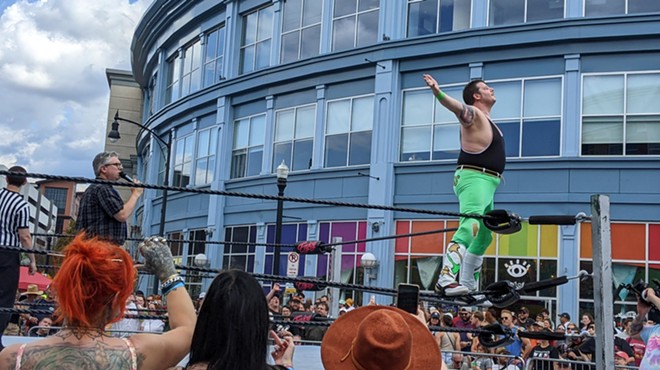To look around, you'd almost never know Pennsylvania could be leading a sea change in national politics on Election Day.
Depending on the outcome of a handful of Congressional races statewide, Pennsylvania could help the Democrats retake the U.S. House of Representatives. And if Senate candidate Bob Casey defeats incumbent Republican Rick Santorum, Pennsylvania could deliver both houses of Congress to the Democrats ... along with the governor's office and, possibly, one house of the legislature in Harrisburg.
We look at some of those races in the stories linked below:
US Congress: Jason Altmire (D) vs. Melissa Hart (R)
US Congress: Chad Kluko (D) vs. Tim Murphy (R)
State House of Representatives: Bill Stalter (R) vs. Don Walko (D)
State House of Representatives: Michael Diven (R) vs. Chelsa Wagner
State House of Representatives: Bill Ogden (R) vs. Tom Petrone (D)
State House of Representatives: Shawn Flaherty (D) vs. Randy Vulakovich (R)
State House of Representatives: Frank Dermody (D) vs. Eileen Watt (R)
State House of Representatives: Mark Harris (R) vs. Matt Smith (D)
Special Election: Pittsburgh City Council District 1
(And for those who've forgotten why beating Rick Santorum is a good thing, we present the top 20 reasons for voting against Rick Santorum.)
But as for the key races for U.S. Senate and governor, political consultant Don Friedman asks, "When's the last time you saw an election with so few yard signs?"
It isn't for lack of passion: Santorum is such a polarizing figure that he alone will increase turnout from both parties. But as Friedman puts it, "Everyone knows Santorum who needs to know him. Everyone knows Casey who needs to know him."
And voters, it seems, feel like they've got all they need to know.
According to a Quinnipiac University poll, at the end of September, 55 percent of Pennsylvanians said they planned to re-elect Gov. Ed Rendell rather than his Republican challenger, former Steelers standout Lynn Swann. That level of support hasn't changed since May. In the Casey/Santorum matchup, the latest Quinipiac poll shows Casey leading by 51 to 39 percent. A poll conducted in July of 2005 showed Casey leading by almost exactly the same margin.
Those numbers mask the change that could take place in Pennsylvania and across the country on Election Day. But with both Democrats in statewide races enjoying leads over their rivals, why aren't local Democrats more excited? And could that lack of excitement cost them key races?
Bob Casey's campaign strategy is easy to describe: It's the old rope-a-dope, in which you dance away from your opponent until he makes a mistake. Casey has kept a low profile, to the point where the race is no longer between Bob Casey and Rick Santorum, but Rick Santorum and himself.
And Santorum is losing.
Santorum's campaign "must be pulling their hair out," says Friedman. "They've got better ads, and Santorum probably won all three debates with Casey." But over the years, Santorum has "made so many people angry. What's hurting Rick Santorum is his own behavior, his interference in things that don't seem to affect Pennsylvania -- like the Terri Schiavo thing."
Polls suggest that more than Casey supporters see themselves as voting against Santorum voters, and the Casey campaign reflects that. Yet his approach frustrates some Democrats too.
For example, there's Casey's position on same-sex couples. While not endorsing full-fledged gay marriage, Casey does espouse civil unions. But it's hard for Dems to find evidence for that in his campaign literature -- or to find a place in his campaign.
"Even people who try to volunteer for his campaign have had a hard time getting involved," says Democratic activist Jeanne Clark. "He just doesn't have a grassroots effort."
As if to prove the point, Casey's campaign did not return calls for comment. But some Casey backers are making political calculations too. "I think we would be happier if Casey were more public" about his support of civil unions, acknowledges Scott Safier, of the gay-rights advocacy group Steel City Stonewall Democrats. "But I guess when your opponent is digging a hole for himself, don't stop him."
Some in Safier's group are frustrated by Casey's pro-life stand, Safier says, and "Originally, he wasn't there on any of our issues. But over time, his position has become more favorable to us." Safier also points out that although Casey is pro-life, unlike Santorum he supports "morning after" contraception and stem-cell research.
Still, some supporters worry that despite what polls say, on Election Day, Casey still won't have given people enough to vote for.
"Santorum has always been able to get his supporters out there," Clark warns. "If the Democrats don't have a real good get-out-the-vote strategy, they're in trouble."
Besides, says Betsy Magley, a co-state director for Progressive Majority, left-leaning candidates don't have to hide their beliefs in order to get elected. "Progressive candidates who are willing to stand up and say, 'This is how I feel, I'm not changing my mind,' those candiates win."
Magley's job is to recruit just such candidates -- pro-choice, pro-labor and just plain progressive -- for state office. Her organization is not involved in either the gubernatorial or Senate campaign, she stresses, but says, "The party needs to get back to looking at what works. And that's the Rendell model."
Indeed, there's rarely any question about where Rendell stands. While Casey dodges his own support for civil unions, Rendell is planning to take part in an Oct. 25 gay/lesbian Pittsburgh bar crawl.
"For good, and sometimes for bad, I speak my mind," Rendell says. "Bob's always been more cautious than I am. ... But my advice is to tell people who you are and what you believe. It's more fun that way. Can you win as a progressive in Pennsylvania? Sure."
But it's not as easy for Casey, Rendell says. "People look for different things in a legislator than in an executive." While an executive can run on a record of individual accomplishment, he says, legislators get little done on their own, and so voters view them "more in terms of ideology."
Casey is also facing Santorum, a nationally known figure who has out-fund-raised Casey $25 million to $15 million. Rendell is facing Lynn Swann, an underfunded political neophyte whose campaign has been short on specifics, energy and money. Rendell, a former chairman of the Democratic National Committee with national funding, had $13.7 million on hand at the time of his most recent financial report -- $10 million more than Swann.
Swann has tried to tar Rendell for the Harrisburg pay-raise fiasco, and to suggest Rendell is too cozy with casino interests. Recently, for example, Swann has been making hay out of a lobbyist with gambling ties who took a flight on a state airplane. (The Rendell camp contends the lobbyist, Richard Gmerek, reimbursed taxpayers for the flight as part of a longstanding practice.)
Swann has one other card to play: Pittsburgh has always been wary of Rendell, a former Philadelphia mayor. Quinnipiac's polling shows that 41 percent of voters from southwestern Pennsylvania disapprove of his job performance -- the highest percentage in the state.
"We've done a lot for Allegheny County," Rendell contends ... reeling off an exhaustive list of state initiatives to prove it.
But Rendell may always be viewed as something of a carpetbagger in Pittsburgh. Which is too bad for Pittsburgh, because with each election, Philadelphia and its suburbs gain in population and significance.
This year, three of the four Pennsylvania Congressional races attracting the most attention this year are in the Philly suburbs. Magley's organization is taking an active part in seven state legislative races, but only one of them -- Frank Dermody's re-election bid against Republican Eileen Watt -- is outside southeastern Pennsylvania.
So no wonder there aren't as many yard signs this year. Not only is Rendell's race not very competitive, but his victory would be a bittersweet reminder of Western Pennsylvania's political weakness. And while Casey's stealth strategy may succeed, it doesn't give partisans much to rally around.
Such concerns may not make a difference this time, given Republican fiascos in Washington and Iraq. As Clark says, "This is one of those elections that happens only a few times in your life: Watergate, the 1994 'Contract With America,' and now this.
But, she adds, "There's a difference between winning and staying in."



















